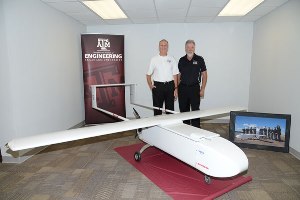Oct 5 2013
A research team led by Texas A&M University professor Dr. John Valasek has designed, built, operated and patented (pending) the Pegasus I Unmanned Air System (UAS).
 Dr. John Valasek (left) with Cecil Rhodes, flight mechanics specialist, with the Pegasus I Unmanned Air System (photo by Texas A&M University-Corpus Christi)
Dr. John Valasek (left) with Cecil Rhodes, flight mechanics specialist, with the Pegasus I Unmanned Air System (photo by Texas A&M University-Corpus Christi)
Valasek is a professor in the Department of Aerospace Engineering and director of the Center for Autonomous Vehicles and Sensor Systems (CANVASS) and the Vehicle Systems & Control Laboratory.
Pegasus I was designed to fill an industry and government customer need for a low-cost, high-durability testbed for evaluation of the following advanced control law and sensor concepts: autolanding, fault tolerant adaptive control, machine learning control,and machine vision relative navigation.
Pegasus I is 11 feet long with a 12-foot wingspan and has a very low designed stall speed of 26 knots. It can carry a 20-pound payload and has a large payload volume of 12U of half-width rack chassis, in addition to a large nose cone for mounting various forward and downward looking sensors. Maximum takeoff weight is 80 pounds.
Pegasus I is also designed to be a control systems integration testbed, and has multiple and redundant control effectors to enhance flight safety and enable automatic controls research: eight ailerons, two elevators, two rudders and one throttle. The powerplant is a 3W-85Xi CS single piston engine with 9.7 HP.
Pegasus II is a lighter-weight derivative of the same configuration and powerplant, and Pegasus III is a smaller and lighter derivative with electric power.
Current Pegasus I research activities are funded by Raytheon Company and the U.S. Air Force Office of Scientific Research.